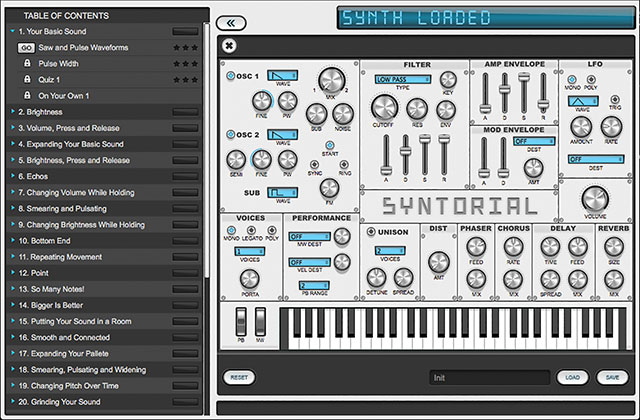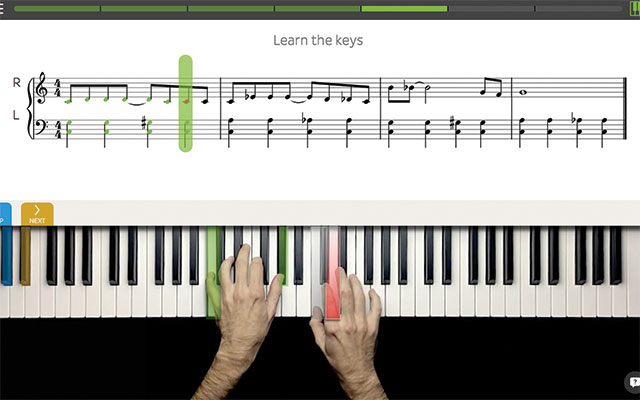As fast as technology seems to move, from time to time I’m reminded about how slowly some seemingly obvious ideas come about. But it seems to be the case that technology-driven educational tools have rather taken their time to mature. Sure, we’ve had basic things like MOOCs (massive open online courses) for a while now, but I’m taking about really elegant applications of technology—clever solutions to unique learning challenges.
Music seems to be one of those areas where the unique challenges are abundantly clear, and the cost of traditional learning approaches (like classes, private lessons, etc.) generally border on outrageous. To me, this screams nothing if not “opportunity,” and it appears that some folks have sensed that and risen to the occasion.
In this round-up, I’ll be taking a look at four particular music-learning tools I’ve found interesting and helpful, and how they’re working to rethink the status quo—while providing new and innovative ways to learn in the process.
Skoove (Web Site): Perhaps one of the most obvious ways one could apply technology to music learning is with keyboards. After all, MIDI has been around for a few decades at this point, so the idea of connecting a keyboard to a computer is hardly a stretch. I’m sure that others have developed learning tools that leverage MIDI keyboards, but Skoove—which I received a tip about a few months ago—seems to have taken a pretty unique approach that’s both accessible, and affordable.
Skoove is, in short, a series of online keyboard lessons. By using the integrated MIDI support of certain web browsers (while providing a plug-in for others), Skoove runs in your web browser like any other web site. All you need to provide is a MIDI keyboard. It’s worth noting that not too long ago, Skoove introduced support for acoustic pianos through “listening” to audio via your computer’s microphone as an alternative to a MIDI keyboard, so you can use conventional instruments with Skoove instead if you prefer.
In playing with Skoove, I found its approach to be interesting, practical, and effective. Like a good teacher, Skoove explains proper technique, and while working your way through increasingly more elaborate musical passages, it teaches you both how to read sheet music, as well as basic elements of music theory.
To be fair, I had about eight years’ worth of jazz-piano lessons back in the day, but never considered myself all that good. Skoove helped me knock the rust of the skills I had, and I felt like I was more successful at bringing my hands together at the keyboard than I was all those years back when it seemed like an extraordinary struggle.
Skoove offers a progression of beginner and intermediate courses, plus specialized courses that include Pop Piano and Christmas titles. Many more are shown on the site and labeled as “coming soon,” so clearly more is in development. I’m particularly looking forward to the rollout of their piano accompaniment course—a skill I never learned in my conventional piano lessons.
Skoove is free to try; Skoove Premium, with access to all its lesson material, is $9.95 per month. Check it out at skoove.com.
Syntorial (Software Tool): When you get your keyboard chops (or perhaps you already have some), you’ll probably want to jump right into playing synthesizers. The thing is, even if you know how to play the notes, do you know how to program the instruments to get that special sound you have in your head? That’s where Syntorial comes in.
While there are numerous synthesis methods around, perhaps the most widely used is subtractive synthesis, and it’s at the core of some of modern music’s most popular and well-known synthesizers—both hardware- and software-based.

When I first saw Syntorial at Winter NAMM 2016, I knew I had to check it out. While I’m an avid user of Sylenth (a popular analog-modeled soft-synth), as well as the proud owner of a Sequential Prophet 6, I’ll be the first to admit that the majority of the time I browse factory presets, then tweak them to my needs; I’ve really never fully understood all the principles of sound design, and haven’t acquired the skills the usual way: endless hours of trial and error and learning by doing.
Syntorial is composed of nearly 200 individual lessons—the first 22 of which are available for review through its free demo. The lessons in Syntorial are progressive—they build, lesson to lesson, on knowledge you’ve already acquired. They’re also quite detailed, and take things at a very modest pace. Because the point is to develop your ability to do this by ear, and to hear the effect each synth parameter has on the sound, that modest pace is actually pretty essential to the success of the program. It does, however, take some effort to resist trying to rush things when the pace starts to get a little sleepy. Stick with it, however; Syntorial really works, and while I’m still working my way through the lessons as I write this review, it’s paid huge dividends already, and prompted me to get out of the “modified-factory-preset” rut.
Syntorial has three (at this writing) Lesson Packs that are available at no additional charge to paid users. Each is for a specific synth, and include packs for Sylenth (38 lessons), Cakewalk’s Z3TA+2 (37 lessons), and the Minimoog Voyager (34 lessons), making the purchase even more valuable and educational if you happen to own one of these popular software or hardware synths.
The cost for the entire lesson series plus the Lesson Packs is $129.99, and includes a VST/AU synth plug-in that reflects the interface shown in the lessons. More information at syntorial.com.
iZotope Pro Audio Essentials (Web Site): Boston’s iZotope is perhaps best known as a producer of some of the music industry’s most beloved audio-processor plug-ins, such as their renowned Ozone mastering tools suite. But the company has also created, over the years, a wide range of material designed to help educate its customers (and honestly, non-customers, too) on various aspects of audio production. In particular, I’ve both enjoyed and found helpful their free e-books on mixing and mastering, but they also offer webinars, videos, and more.
Most recently the company rolled out an interactive learning toolset called Pro Audio Essentials. Announced by the company this past May, it gives the impression that perhaps they jumped the gun a little, as the toolset is largely unfinished. (Don’t let that stop you; I’ll explain in a moment.) The three modules shown today include some tough-to-grasp territory: equalization, compression, and what the company calls “digital audio basics” which includes topics on sample rate, bit depth, and lossy audio (the effects of file compression, not to be confused with audio compression).
Only the equalization module is truly complete. Within it, four sub-modules are available: learn (primarily video content), explore (interactive exploration of the concepts that help you understand the effects of changes on what you hear), practice (which is as the name suggests), and challenge (to test your understanding). For both compression and digital audio basics, the site says that they are largely coming soon, but an array of educational videos is available now for both.
In playing with the equalization module, I have to say, I found Pro Audio Essentials both extremely challenging, and extremely educational. It’s easy to read about concepts, but the ability to both learn and then apply and evaluate your grasp really makes a difference. It also proves once again that practice is key with most aspects of musical creativity—but Essentials makes it easier to get contextually meaningful practice.
Pro Audio Essentials is free; check it out at pae.izotope.com. Additional educational content can be found on iZotope’s main web site, izotope.com, in the Learning section.
Theory Lessons & Tenuto (iOS Apps) and MusicTheory.net (Web Site): So-called perfect pitch—the ability to identify or recreate a musical note without a reference tone—is said to be fairly rare, and is also said not to be connected to musical ability or lack thereof. More accurately called absolute pitch, it’s one of two similar but separate abilities, the other being relative pitch (the ability to identify an interval between two musical notes). Most sources agree that you’re only born with the former, but the latter can be developed through training.
That’s a good thing, because I’ve found my relative pitch ability to be pretty sorely lacking, which can in turn make certain musical production tasks (writing and arranging additional musical parts in a composition, for one) to be a little harder than they ought to be. Enter this trio of resources.
MusicTheory.net is a web site that provides a wide range of music-theory learning resources, all of which are available free of charge. The content is divided into three key sections: lessons, exercises, and tools.
The lessons section covers a lot of music theory territory, including scales, chords, chord progressions, and more. It’s a great collection of information to build a solid understanding of how music works. The exercises help you apply that knowledge, while adding things to the mix such as the aforementioned ear training for chords, intervals, and such. The tools section includes interactive music calculators of various types.
The site’s content is free, and supported through the sale of the apps, which are currently only available for iOS. The Theory Lessons app ($2.99) includes the lesson material from the site, while Tenuto ($3.99) includes the exercises and calculators.
The web site provides a nice collection of material to refresh some of my existing music theory knowledge and fill-in some blanks from back in the day. But what I found most valuable were the note exercises I mentioned earlier, and the Tenuto app gives the flexibility to work on this sort of ear training virtually anytime, anywhere. I’ve come to enjoy using it as a sort of “time passer with an upside” during dull airplane flights, waits in long lines, and so on.
Is it improving my ear and benefiting my studio time? I’d like to think so; time will certainly tell. Free web content and info about the apps at musictheory.net.
If you have any questions for Wesley Bryant-King or Making Tracks, please send them to djtimes@testa.com.







